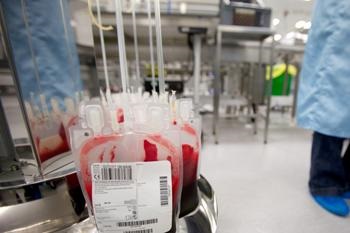Jul 10 2015
Changing clinical thresholds for the single leading reason for blood transfusions could safely produce significant savings for the NHS, according to NHS Blood and Transplant (NHSBT) research published in The Lancet tomorrow (Saturday July 11).

NHS Blood and Transplant blood processing centre at Filton
The results come in the first reported multicentre randomised trial comparing red blood cell transfusion strategies for Acute Upper Gastrointestinal Bleeding (AUGIB).
The TRIGGER trial was a pilot study which compared liberal and restrictive policies for red blood cell transfusions in patients with AUGIB. The results showed no significant difference in clinical outcomes between the two patient groups. The study established that a future large cluster randomised trial, which could lead changes in clinical practice guidelines, is both feasible and essential.
Lead researcher Dr Vipul Jairath, an NIHR Clinical Trials Fellow and Consultant Gastroenterologist at Oxford University Hospitals, said:
If restrictive practice is proven to be safe in a large study, it could potentially safely reduce the use of red blood cell transfusions and produce cost savings for the NHS.
A reduction in red blood cell transfusion for AUIGIB would have substantial financial implications. In 2013-14, an estimated 204,000 units of red blood cells were issued for AUGIB, costing £123.31 per unit. A 13% reduction, as shown in this trial, would lead to annual savings to the NHS of about £3.3m for the blood alone, which excludes laboratory and administration costs.
Acute upper gastrointestinal bleeding accounts for 70,000 hospital admissions per year and 11% of all red blood cell units transfused in England. It is the single leading clinical indication for transfusions for red blood cells. However there is no clear optimum threshold for the use of red blood cell transfusions.
The UK Blood Transfusion Guidelines say transfusions are a key component of many modern surgical and medical interventions. However, the guidelines warn, ‘blood components are expensive, may occasionally have serious adverse effects and supplies are finite. Avoiding unnecessary and inappropriate transfusions is both good for patients and essential to ensure blood supplies meet the increasing demands of an ageing population’.
NHSBT funded and ran the TRIGGER (Transfusion in Gastrointestinal Bleeding) project to establish the feasibility of a larger trial. TRIGGER was a cluster randomised pilot trial to compare liberal and restrictive policies for red blood transfusions in patients with AUGIB. Six hospitals were randomised so that all patients admitted with AUGIB were treated with either a liberal or a restrictive policy for red blood cell transfusions.
Prof Mike Murphy, Professor of Transfusion Medicine at the University of Oxford and Consultant Haematologist for NHSBT and the Oxford University Hospitals said:
This was world class research, which was only possible though a successful collaboration between specialists in transfusion medicine, gastroenterology and emergency medicine supported by the NIHR clinical research networks.
The TRIGGER trial has paved the way for a phase 3 trial to provide the evidence for definitive guidelines on the transfusion management of AUGIB.